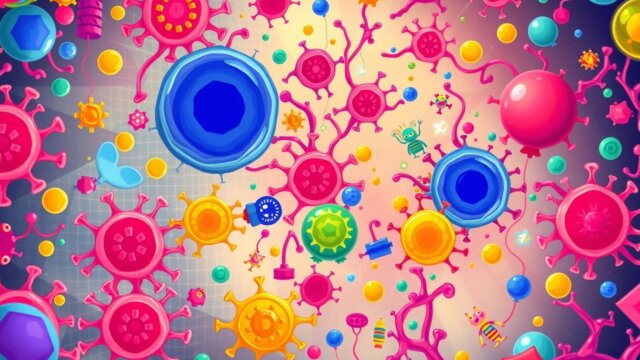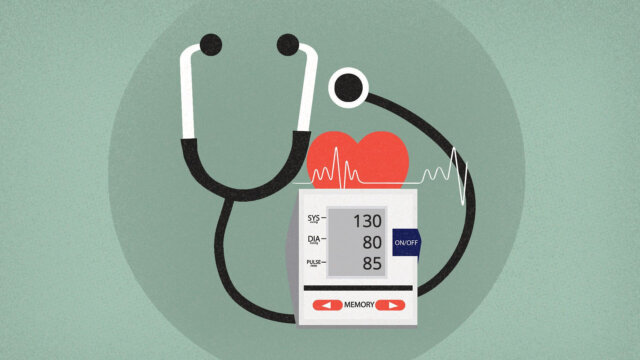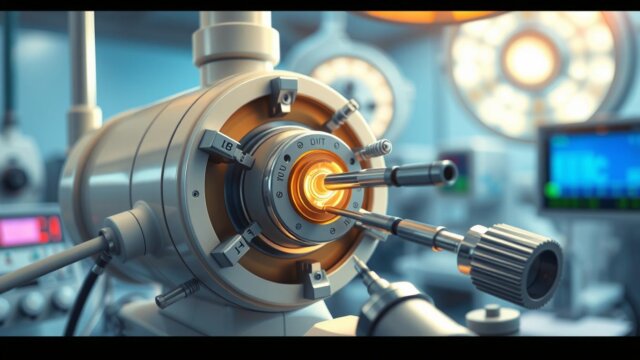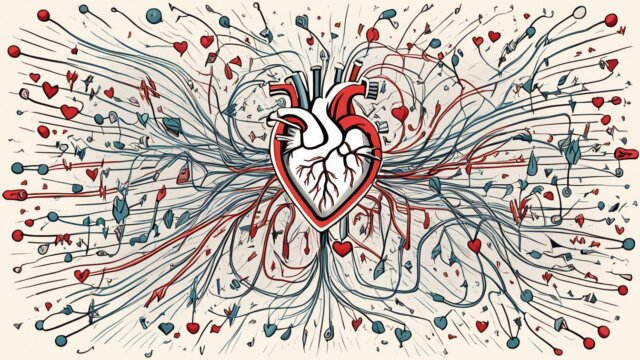FTC disclaimer: This post may contains affiliate links and we will be compensated if you click on a link and make a purchase.
Did you know that over 15 million people in the U.S. get heartburn every day? This common issue comes from acid reflux. It happens when the muscle at the top of the stomach doesn’t close right. This lets stomach acids flow back up into the esophagus.
This can cause a burning feeling in the chest. It’s called gastroesophageal reflux disease (GERD). If not treated, it can lead to serious health problems.
Heartburn is a sign of acid reflux. It feels like a burning pain in the lower chest. If acid reflux happens often, more than twice a week, it’s called GERD. This can cause inflammation, ulcers, hoarseness, lung disease, and even cancer risks.
Key Takeaways
- Heartburn is a common condition caused by acid reflux, where stomach acids back up into the esophagus.
- Persistent acid reflux, known as GERD, can lead to complications like esophageal inflammation, ulcers, and increased cancer risk.
- Heartburn symptoms include burning chest pain, nighttime discomfort, difficulty swallowing, and a sensation of food stuck in the throat.
- Risk factors for heartburn include certain foods, habits, medications, and underlying medical conditions.
- Over-the-counter medications and lifestyle changes can help alleviate heartburn symptoms.
What is Heartburn?
Definition and Causes
Heartburn is when your esophagus gets irritated. This tube connects your throat and stomach. It makes your upper belly or chest feel like it’s burning. This happens when stomach acids go back up into your esophagus because the LES muscle doesn’t close right.
Some foods and drinks can make heartburn worse, like coffee, tomatoes, alcohol, chocolate, fatty, or spicy foods. Being overweight makes it more likely to have heartburn. Smoking can also make it worse. Stress and anxiety can make the symptoms of heartburn worse.
Changes in hormones, like more progesterone and estrogen, can cause more heartburn. Some medicines, like painkillers, can also make heartburn worse.
About 20-30% of people in the U.S. have GORD because of ongoing heartburn and acid reflux. Avoiding certain foods and drinks can help ease heartburn symptoms.
Heartburn affects around 60 million Americans at least once a month, making life harder. Chronic GERD can cause esophagus narrowing, ulcers, dental problems, chronic cough, asthma symptoms, and even esophageal cancer.
Heartburn can last from a few minutes to hours, based on how long digestion takes, which is two to five hours. Some signs of acid reflux include hiccups, chronic cough, worsening asthma, sore throat, and trouble swallowing.
Things that can weaken the LES muscle include smoking, too much pressure on your stomach, hiatal hernia, eating too much, indigestion, lying down after eating, certain foods, and some medicines. Getting older, gaining weight, and some medicines can also make heartburn worse over time.
Heartburn is often from acid reflux, but it can also be from other conditions like esophageal ulcers, esophagitis, and functional heartburn/reflux hypersensitivity. Long-term heartburn can lead to serious problems like esophageal strictures, Barrett’s esophagus, and esophageal cancer.
Heartburn can show there are problems in your digestive system, like too much stomach acid, gastritis, stomach ulcers, making breathing problems worse, swelling, ulcers, and throat growths.
Symptoms of Heartburn
Heartburn is a common issue that causes a burning feeling in the chest and throat. It’s marked by a burning sensation. There are other signs that may show heartburn or GERD.
A key symptom is a burning feeling in the chest’s middle. This can feel like discomfort or pain that spreads to the throat. This happens when stomach acid goes back up into the esophagus, irritating it. Some people might taste something hot, acidic, bitter, or salty in their throat. This means the refluxed contents have reached the upper part of the digestive system.
Heartburn can also make swallowing hard or feel like food is stuck in the chest or throat. This can be scary and might make you worry about serious health issues. But, this problem usually goes away once the refluxed material moves on.
Heartburn gets worse at night, after eating big or fatty meals, or when bending or lying down. At these times, the body’s acid-clearing mechanisms are weaker. This lets more acid reflux happen.
Heartburn is the main sign of GERD, but some people also get nausea, back pain, or asthma-like symptoms. These can happen when stomach contents that came back up irritate the throat, airways, or nearby structures.
It’s key to know the signs of heartburn and tell them apart from other digestive problems or conditions. If heartburn symptoms don’t go away or get worse, seeing a doctor is a good idea. This is because not treating GERD can lead to serious problems.

In summary, heartburn’s main signs are a burning feeling in the chest and throat, trouble swallowing, and a sour or acidic taste in the mouth.
Other signs like nausea, back pain, and breathing issues might also show heartburn and GERD. Spotting and treating these signs early can stop the condition from getting worse and prevent serious health issues.
Heartburn vs. Other Conditions
Distinguishing Heartburn from Other Digestive Issues
Heartburn is often confused with other health issues. But it’s key to know the difference. Heartburn and a heart attack both cause chest pain. But heartburn feels like burning, while a heart attack feels like tightness or pressure.
Heartburn happens when stomach acid goes back up into the esophagus. It’s different from indigestion, which is belly discomfort after eating. Indigestion can be from many digestive problems.
Conditions like gallstones, peptic ulcers, and hiatal hernias can feel like heartburn. Gallstones cause pain in the belly that can last a long time after eating fatty foods. This pain is in the middle or right side of the belly.
Peptic ulcers also cause stomach pain and heartburn, especially after eating fatty foods. This can lead to more belching and bloating.
Hiatal hernias push part of the stomach up through a weak muscle. This can make heartburn worse. Esophageal spasms can cause a lot of chest pain and make swallowing hard. They can also make you feel like something is blocking your throat.
Esophagitis, or inflammation of the esophagus, can make swallowing hard and cause chest pain. It can also make you feel like something is blocking your throat. This is often because of heartburn or GERD.
If heartburn doesn’t go away with treatment, see a doctor. Long-term acid reflux can increase the risk of esophageal cancer.
Condition | Symptoms | Key Differences from Heartburn |
|---|---|---|
Heart Attack | Tightness or pressure in the chest, which may spread to the arms, jaw, or back; shortness of breath; nausea or vomiting | Heartburn typically involves a burning sensation, while a heart attack usually causes tightness or pressure in the chest. Heart attack symptoms are more common with physical activity. |
Gallstones | Intense, steady ache in the upper middle or right abdomen, often after a fatty meal; pain may spread to the shoulders, neck, or arms | Gallstones can cause heartburn-like symptoms that last for hours after a fatty meal, with pain localized to the abdomen rather than just the chest. |
Peptic Ulcer | Burning stomach pain and heartburn, often worsened after eating fatty foods; increased belching and bloating | Peptic ulcers can cause similar symptoms to heartburn, but the pain is typically localized to the stomach rather than just the chest. |
Knowing the differences between heartburn and other digestive issues helps get the right medical care. Getting the right treatment is key for good gut health.
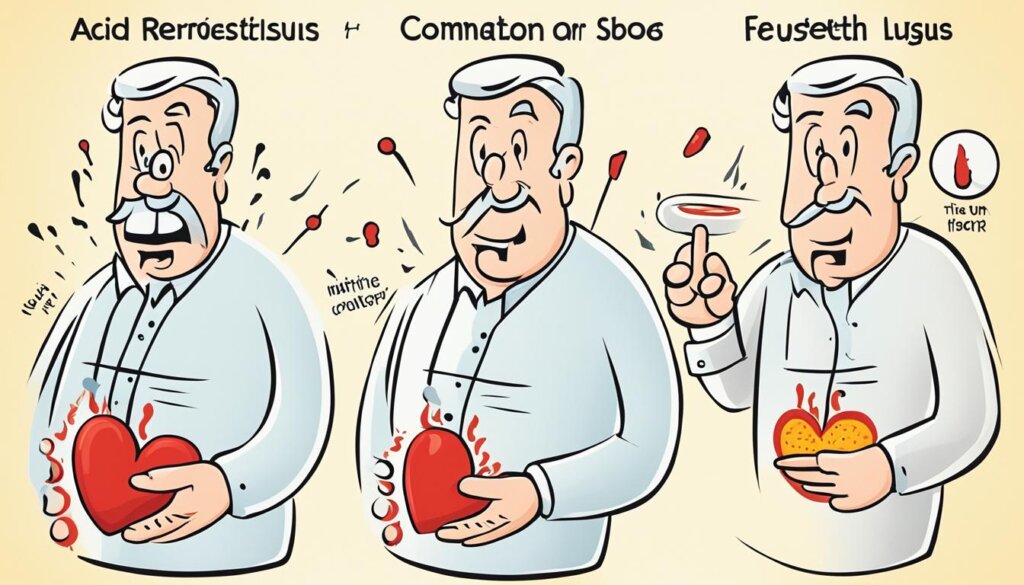
Risk Factors for Heartburn
Heartburn is a common issue that can be caused by many things. Foods like tomatoes, citrus fruits, garlic, onions, chocolate, coffee, alcohol, and high-fat foods can make heartburn worse. Lifestyle choices also play a big part, such as eating before bed, smoking, wearing tight clothes, and lying down after eating.
Hiatal hernia, a stomach issue, can also lead to acid reflux. Being pregnant can make heartburn worse because of the hormones that relax the LES. Smoking hurts the mucus membranes and makes acid reflux more likely.
Drinking alcohol can also cause heartburn and increase the risk of esophageal cancer. Being overweight or obese makes acid reflux more common. Eating a big meal and then lying down can make symptoms worse. Some medicines, like aspirin or certain blood pressure drugs, can also cause acid reflux.
Risk Factor | Impact on Heartburn |
|---|---|
Hiatal hernia | Common stomach abnormality that can lead to acid reflux disease |
Pregnancy | Increased hormone levels can cause the LES to relax, leading to heartburn, especially in the third trimester |
Smoking | Can damage mucus membranes, impair muscle reflexes, increase acid secretion, reduce LES function, and decrease salivation, increasing the risk of acid reflux disease |
Alcohol consumption | Known trigger for heartburn and acid reflux symptoms, and increases the risk of esophageal cancer |
Overweight or obesity | More prone to acid reflux disease |
Certain medications | Aspirin, ibuprofen, muscle relaxers, or specific blood pressure medications can contribute to acid reflux disease |
Knowing what causes heartburn helps people prevent and manage it. They can change their lifestyle, avoid certain foods, and see a doctor if symptoms get worse.

Heartburn
Heartburn is a common symptom of acid reflux. This happens when stomach contents flow back up into the esophagus. This is because the lower esophageal sphincter (LES) muscle is weak or relaxed.
This lets stomach acids irritate the esophageal lining. It causes a burning sensation in the chest.
Gastroesophageal reflux disease (GERD) is when acid reflux happens often. It happens more than twice a week. GERD can cause heartburn, regurgitation, bloating, and trouble swallowing.
Acid reflux and GERD can be caused by lifestyle choices. These include eating big meals, lying down after eating, being overweight or obese, and eating certain foods and drinks. Pregnancy, smoking, and some medicines can also raise the risk.
Symptoms of acid reflux and GERD include a burning feeling in the chest, a sour taste in the mouth, trouble swallowing, and even noncardiac chest pain. Babies and young kids might get fussy, have trouble sleeping, and wheeze.
If acid reflux symptoms happen more than twice a week, it could be GERD. Doctors use tests like barium swallow radiographs, endoscopies, and pH monitoring to diagnose GERD.
Treatment for heartburn and GERD starts with lifestyle changes and over-the-counter medicines. But in severe cases, surgery might be needed. If not treated, GERD can lead to esophagitis, esophageal stricture, and a precancerous condition called Barrett’s esophagus.
It’s key to know the causes, symptoms, and treatments for heartburn and GERD. This helps manage this common digestive issue and prevent serious problems. By fixing the root causes and getting the right medical care, people can feel better and keep their digestive health in check.
Diagnosing Heartburn and GERD
If your heartburn is ongoing or bad, your doctor might suggest tests to find out if you have gastroesophageal reflux disease (GERD). This is a condition where acid flows back up often. These tests help understand what’s causing it and how bad it is. They help pick the right treatment.
An endoscopy is one test. It uses a flexible tube with a light to look inside your esophagus, stomach, and duodenum. This lets your doctor see if there’s inflammation or damage.
Your doctor might also suggest an ambulatory acid probe test, or pH monitoring. This test checks how often acid flows back up in your esophagus. It helps confirm GERD and see if treatments are working.
Esophageal manometry is another test. It looks at how your esophagus moves when you swallow. This can show problems with the muscle that stops stomach acid from coming up.
If over-the-counter drugs or lifestyle changes don’t help, more tests might be needed. Your doctor might order an X-ray to check your esophagus and stomach shape and condition.
Working with your healthcare provider is key to finding the right treatment for heartburn or GERD. With the right tests and treatments, you can feel better and avoid problems.
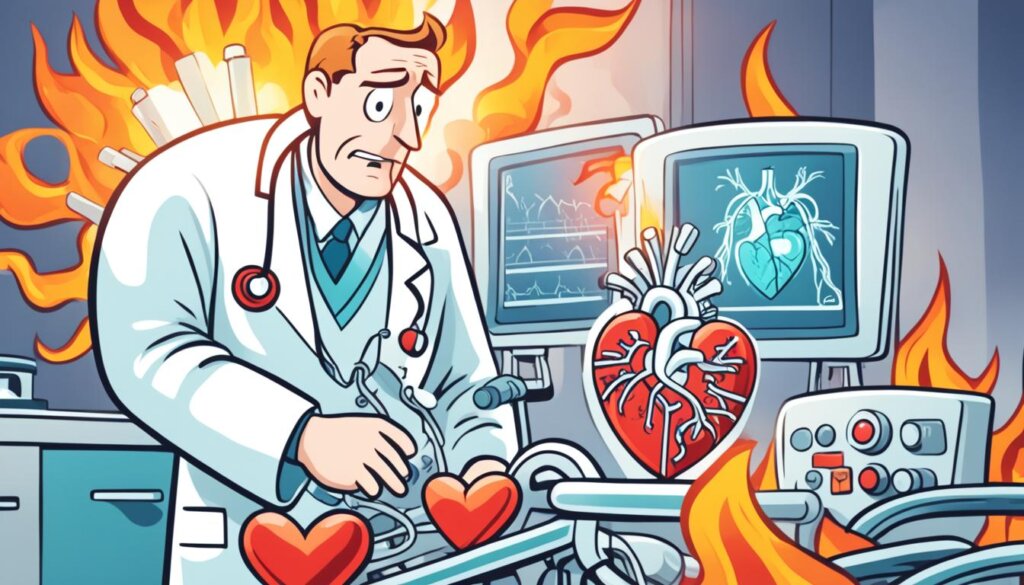
“Accurate diagnosis is key to effective treatment for heartburn and GERD. Your doctor will work with you to determine the best approach based on your individual symptoms and medical history.”
Complications of Untreated Heartburn
Occasional heartburn is common and can be managed. But, if it’s not treated, it can lead to serious problems. Untreated heartburn can turn into more serious issues like esophagitis, esophageal strictures, and respiratory problems. It can even increase the risk of esophageal cancer.
Potential Risks of Chronic Acid Reflux
Stomach acid can cause inflammation and damage to the esophagus. This leads to a condition called esophagitis. This inflammation can get worse and cause esophageal strictures.
These strictures make swallowing hard and can cause malnutrition and dehydration.
Chronic acid reflux can also cause respiratory problems. These include asthma, chronic cough, and even aspiration pneumonia. The stomach acid can irritate the airways and lungs, making breathing hard.
Untreated heartburn also raises the risk of esophageal cancer. While the risk is low, it’s still higher than for those without chronic acid reflux.
Untreated GERD can also harm your oral health. It can cause tooth decay, enamel erosion, and teeth to darken. This is because stomach acid can wear down the enamel and damage the teeth.
Ignoring persistent heartburn can lead to serious problems. It’s important to see a doctor and follow a treatment plan. This can help prevent long-term complications from chronic acid reflux.
Heartburn During Pregnancy
Heartburn often gets worse during pregnancy because of hormonal changes and stomach pressure. Many pregnant women experience heartburn and indigestion. These symptoms include a burning chest feeling, feeling too full, bloating, burping, feeling sick, and bringing up food. These symptoms start more often after 12 weeks of pregnancy.
Being pregnant can make heartburn more likely for several reasons. Hormonal changes, the baby pressing on the stomach, and relaxed stomach muscles are to blame. Being prone to indigestion before pregnancy, having been pregnant before, and being in later pregnancy stages also raise the risk.
Heartburn usually happens in the second or third trimester. Women who had heartburn before pregnancy are more likely to have it during pregnancy. The hormone progesterone relaxes the esophageal sphincter, causing heartburn.
There are ways to ease heartburn during pregnancy. Eating smaller meals, avoiding fried or spicy foods, and not lying down after eating can help. Safe over-the-counter antacids can also be used during pregnancy. If symptoms are severe, doctors may prescribe stronger medicines.
Understanding the causes and taking steps to prevent it can help pregnant women feel better.
When to Seek Medical Attention
If you have heartburn now and then, it’s usually okay. But, you should see a doctor if it’s bad, doesn’t go away, or comes with other scary signs. If you have heartburn more than 3-4 times a week, trouble swallowing, losing weight without trying, or vomiting blood, get help.
Severe or ongoing heartburn could mean something serious like GERD. This can cause problems like esophagitis, a narrowed esophagus, bleeding, and Barrett’s Esophagus.
If your heartburn comes with chest pain, pressure, sweating, dizziness, or shortness of breath, see a doctor fast. These signs could mean a heart attack. Going to the ER is a good idea to check for serious heart problems. If you have GERD and suddenly have bad symptoms, get medical help to avoid complications.
While some heartburn can be handled with over-the-counter meds, don’t ignore severe or ongoing symptoms. A doctor can figure out why you have heartburn and help you with treatment.
FAQ
What is heartburn?
Heartburn is a burning feeling in your chest. It happens when stomach acids go back up into your esophagus. This is due to acid reflux, which is when your LES muscle doesn’t close right.
What are the main symptoms of heartburn?
Heartburn’s main symptom is a burning feeling in your chest and throat. You might feel pain in your chest after eating or at night. You could also taste something hot, acidic, bitter, or salty in your throat.
Some people feel like food is stuck in their chest or throat.
How is heartburn different from a heart attack?
Heartburn and heart attacks both cause chest discomfort. But, a heart attack feels like tightness and pressure in your chest. Heartburn is more like burning.
Heartburn is a sign of acid reflux. Indigestion, on the other hand, is belly discomfort, often after eating. It can mean other digestive issues.
What are the risk factors for heartburn?
Eating certain foods like tomatoes, citrus fruits, garlic, onions, chocolate, coffee, alcohol, and high-fat foods can cause heartburn. These foods relax your LES or increase stomach acid.
Lifestyle choices like eating before bedtime, smoking, wearing tight clothes, and lying down after eating can also increase your risk. Stress, pregnancy, and some medications can make it worse.
How is heartburn diagnosed?
If heartburn is ongoing or severe, your doctor might suggest tests for GERD. These tests include endoscopies, pH monitoring, or esophageal manometry to check your LES function.
What are the potential complications of untreated heartburn?
Untreated chronic acid reflux can cause esophagitis, esophageal strictures, respiratory problems, and increase the risk of esophageal cancer.
How can I manage heartburn during pregnancy?
During pregnancy, heartburn is common due to hormonal changes and stomach pressure. This section gives tips for managing heartburn during pregnancy.
When should I seek medical attention for heartburn?
If you have severe or persistent heartburn, or if it comes with other concerning signs like trouble swallowing, losing weight, or vomiting blood, see a doctor.


